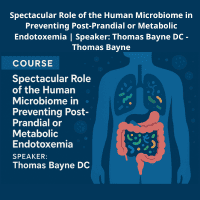Course Summary:
This course, presented by Dr. Thomas Bayne DC, delves into the fascinating and critical role of the human microbiome in safeguarding against post-prandial (after-meal) and chronic metabolic endotoxemia. Metabolic endotoxemia is a condition characterized by elevated levels of endotoxins (lipopolysaccharides or LPS) from gut bacteria entering the bloodstream, potentially triggering inflammation and contributing to various metabolic disorders. Dr. Bayne elucidates how a healthy and diverse gut microbiome acts as a crucial barrier and regulator, preventing excessive endotoxin leakage and maintaining metabolic health. The course explores the mechanisms by which specific gut bacteria influence intestinal permeability, modulate the immune response, and ultimately protect against the detrimental effects of endotoxemia.
Target Audience:
This program is ideal for:
- Healthcare professionals (doctors, chiropractors, nutritionists, nurses, etc.) seeking to deepen their understanding of the gut microbiome and its clinical implications.
- Individuals interested in optimizing their gut health and preventing metabolic disorders.
- Researchers and students in the fields of microbiology, nutrition, and metabolic health.
- Anyone looking for evidence-based information on the link between gut bacteria and systemic inflammation.
Main Content:
The course likely covers key areas such as:
- Understanding the Human Microbiome: An overview of the diverse community of microorganisms residing in the human gut.
- What is Endotoxemia? Explanation of lipopolysaccharides (LPS) and the process of endotoxin translocation into the bloodstream.
- Post-Prandial Endotoxemia: How dietary factors influence gut permeability and the transient increase in endotoxins after meals.
- Metabolic Endotoxemia: The chronic elevation of endotoxins and its association with metabolic disorders like insulin resistance, obesity, and cardiovascular disease.
- The Gut Microbiome’s Protective Mechanisms: How a healthy gut microbiome strengthens the intestinal barrier and reduces endotoxin leakage.
- Key Gut Bacteria and Their Roles: Identifying specific bacterial species and their impact on gut health and endotoxin regulation.
- Factors Influencing the Gut Microbiome: Discussing the impact of diet, lifestyle, stress, and medications on the composition and function of the gut microbiota.
- Strategies for Promoting a Healthy Microbiome: Evidence-based approaches to support a beneficial gut bacterial balance, including dietary interventions, prebiotics, and probiotics.
- Clinical Implications of Microbiome Modulation: Potential therapeutic strategies targeting the gut microbiome to prevent and manage metabolic endotoxemia and related conditions.
Discover the gut microbiome's crucial role in metabolic health!
SIGN UP NOW






